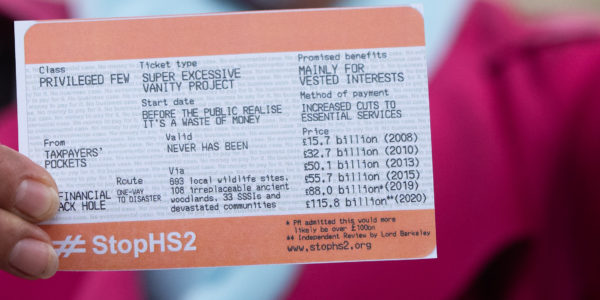
We Stand With Stop HS2
HS2 is costing the taxpayer over £106bn to shave only 25 minutes off an existing journey. It will be boarded mostly by new passengers. It won't be carbon neutral for over 120 years and its construction is destroying wildlife & ecosystems; all the while we're in the midst of a Climate & Ecological Emergency.
We need to Act Now. We need to #StopHS2.
Rebels Join Crackley Wood Protest
The Stop HS2 campaign is the national grassroots campaign against HS2, the proposed new High Speed Two railway. It will pass through or adversely impact over 130 protected wildlife sites and over 50 ancient woodlands.
From Friday 30th Oct – Tuesday 3rd Nov XR Cymru, Cardiff, Bristol and the South West will be co-hosting a trip for rebels to Crackley Wood protest camp to stand together and take action against HS2.
We aim to show solidarity with Stop HS2 protestors and platform the courageous work they have done to date.

Photo Credit: Talia Woodin
Why We Stand With Stop HS2
The Government, Department for Transport and HS2 Ltd have gone to extraordinary measures to sell this project to the public. The ugly truth is that:
- HS2 won’t be carbon neutral for over 120 years
- HS2 is not a viable ‘public transport’ investment with 95% passengers to be new journeys created & switching from current rail journeys
- HS2 is damaging huge swathes of woodland, habitats & ecosystems whilst we’re in a global ecological crisis
- HS2 costs are wildly out of control, costing the tax payer over £106bn (enough to fund the NHS for a year)

Photo Credit: Gareth Morris
We must expose the ugly truth and #StopHS2
But isn’t it putting Britain on track to a net zero carbon future?
The UK passed laws last year to commit to bring all greenhouse gas emissions to net zero by 2050 but HS2 still wouldn’t be carbon neutral in 2140.
According to HS2 Ltd’s own figures, even after 120 years HS2 would still not have achieved carbon neutrality.
Whilst widely advertised and publicised as “putting Britain on track to a net zero carbon future”; HS2 itself will not be carbon neutral in it’s lifetime.
But It’s Public Transport?
HS2 Ltd and the government claim widely it will reduce carbon emissions from other modes of transport (it’s all over their website!) but estimate in their own figures that only 1% of passengers would use HS2 instead of flying, and 4% instead of cars.
The remaining 95% is expected to be new journeys created & switching from current rail journeys.
In fact, HS2 will enable airport expansion. The project will actually facilitate the large-scale expansion of multiple airports across the UK; even after an appeal court ruling on the legality of plans for a third runway at Heathrow Airport said the government’s infrastructure plans failed to take account of its climate commitments under the Paris Agreement.
What’s more, this project is going ahead in a time where the Treasury are looking to save £700m per month on the rail sector (which is currently being paid to railways to substitute the fares lost through lockdown and the government’s advice to avoid public transport where possible).
“If Treasury wants to save £700m per month on the rail sector, then it could cancel or reduce the scope of HS2, saving up to £120bn, and invest, instead, on modernisation the classic regional rail infrastructure and instruct the Department for Transport Ministers to encourage and promote rail transport rather than tell people to avoid rail where possible.
“That is the quickest way of increasing the revenue of the railways and helping the transport sector achieve zero carbon.”Tony Berkeley, former chair of the Rail Freight Group and member of the Oakervee review panel
But Boris Committed To Protecting UK Land?
This month, Boris Johnson promised to protect 30% of UK’s land by 2030 but continues with HS2 project that will destroy or negatively impact over 690 wildlife sites.
Anyone that has watched David Attenborough’s Extinction: The Facts will have been chilled by the stark warning of the impacts of biodiversity loss on the future of our planet and human life.
This destruction is happening on our doorstep; HS2 will be responsible for the destruction of huge swathes of woodland and natural habitats; putting many species at risk.
What’s more, many of the areas that HS2 will bulldoze through are protected: Five internationally designated wildlife sites, 33 Sites of Special Scientific Interest, 21 Local Nature Reserves, 693 Local Wildlife Sites, 22 Living Landscapes, 18 Wildlife Trust nature reserves, 4 Nature Improvement Areas – three of which were in collective receipt of £1.7 million of public money for restoration and to better connect them up for wildlife and people – work which will be undone under current plans.
Shockingly, we have seen multiple examples of inappropriate mitigation measures, including planting plantation woodland of low-wildlife value, which would negatively impact existing habitats.
European Protected Species (EPS) are also present within the proposed HS2 route corridor, including otter, great crested newt and several species of bats. Nationally protected species such as freshwater crayfish, stag beetle, smooth newt, great crested newt, common frog, slow-worm, common lizard, European water vole, Eurasian badger, rare butterflies and breeding birds are known to be present in the impact zone.
What else could £106bn pay for?
Former Chair of HS2 Ltd, Terry Morgan, told the Lords Economics Affairs Committee in January 2019 that “nobody knows” how much HS2 would cost. The National Audit Office (NAO) has warned it is impossible to “estimate with certainty what the final cost could be”.
The cost of HS2 has spiralled from original estimations at £32bn in 2012 to estimations of £106bn in the Berkeley Report.
Estimations show that HS2 will surpass £106bn, this investment could:
- fund the NHS for an entire year
- pay for nearly 4 million university degrees
- pay for a years worth of pensions
- fund numerous rail modernisation projects
With the £32bn original costings, we could have:
- 30 tram systems in regional cities saving 18 million hours per day if they only sped your morning commute up by 5 minutes (HS2 will only save 50,000 hours per day in comparison)*
For further context on the amount of money being pumped into this project, this amount could even buy every player in the Premier League!
*With £32bn you could have bought 1500km of tramways. A good tram system is about 50km (Manchester is 40km). The predicted number of passengers using HS2 in 2033 is 120,000 per day, but 30 tram systems could move 1.8 Million people (Manchester moves 60,000ppl per day). HS2 saves 25mins from Birmingham to London, which for 120,000 people is 50,000 hours saved per day, but 30 tram systems could save 18 million hours per day if it sped your morning commute up by only 5 minutes.

Sign up to the XR Bristol Newsletter
Get the latest XR news and updates about actions and events in the Bristol area

Support us. Donate to XR Bristol
A monthly or one-off donation will help us raise awareness, train members and fund actions.
